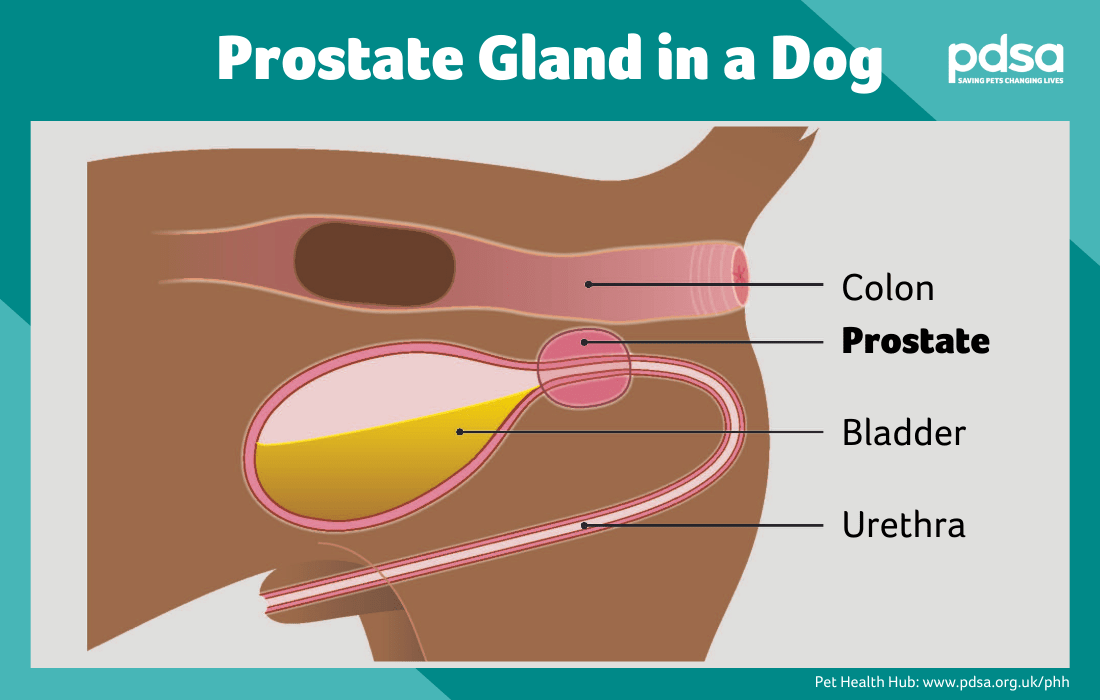Enlarged Prostate in Dogs
Overview
- The prostate gland is a small gland that male dogs have just inside their bottom.
- It sits wrapped around the urethra (urine pipe) just underneath the colon, so it can cause toileting problems if it becomes enlarged.
- Infection, cancer, and benign prostatic hyperplasia (BPH) are some of the most common problems that cause the prostate gland to become enlarged.
- Prostate problems can affect any male dog but they tend to be more common in entire (uncastrated) dogs.

The prostate gland is a small reproductive gland that all male dogs have. It is fuelled by testosterone (from the testicles), and produces fluid for sperm to travel in. It sits surrounding the urethra (urine pipe), just underneath the colon, and often squashes both of these if it becomes enlarged, making it difficult to pee and poo. There are three main causes of prostate enlargement in dogs:
- Benign prostatic hyperplasia/BPH – enlargement due to long term exposure to testosterone (common in old dogs)
- Prostatitis – enlargement because of an infection and/or inflammation
- Prostate cancer – enlargement due to a tumour
Symptoms of a prostate problem
If your dog’s prostate becomes enlarged, it’s likely that they will develop some of the following symptoms:
- Problems peeing (straining/peeing little and often)
- Blood in urine
- Straining to poo
- Blood or pus from their penis
- A painful tummy
- High temperature (in severe cases/infections)
Diagnosis
To decide on a treatment plan, your vet will need to find out why your dog’s prostate is enlarged. They may suggest some of the following investigations:
- Palpating (physically checking) your dog’s prostate by rectal exam
- A urine sample
- Blood tests
- X-rays
- An ultrasound scan
- A biopsy from your dog’s prostate
- Referral for specialist tests such as MRI or CT scans
When to contact your vet
Contact your vet if you suspect your dog might have a prostate problem, or you notice any of the symptoms above. Contact your vet immediately if your dog is in severe pain or straining to pee and not passing anything.
Preventing prostate problems
Castration is the best way to prevent your dog from developing some of the most common prostate problems (prostatitis and BPH), because it reduces the amount of testosterone your dog produces and therefore causes their prostate to become smaller and less active. Talk to your vet about the best time to neuter your dog. Unfortunately, castration doesn’t reduce the chance of prostate cancer in dogs.
Cost
Treatment for prostate problems can be very expensive so it’s important to speak openly to your vet about your finances, the cost of treatment, as well as what you think is right for your dog. There might be more than one treatment option, so if one doesn’t work for you and your dog then your vet may be able to offer another.
When you welcome a new dog into your life, consider getting dog insurance straight away before any signs of illness start. This will give you peace of mind that you have some financial support if they ever get sick.
Published: Dec 2021
Did you find this page useful?
Tell us more
Please note, our vets and nurses are unable to respond to questions via this form. If you are concerned about your pet’s health, please contact your vet directly.
Thank you for your feedback
Want to hear more about PDSA and get pet care tips from our vet experts?
Sign up to our e-newsletter
Written by vets and vet nurses. This advice is for UK pets only. Illustrations by Samantha Elmhurst.

